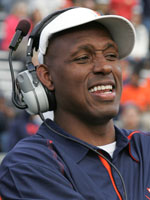 |
|
“One reason I can look back with no regrets is that I love this place” – Coach Anthony Poindexter |
Anthony Poindexter has been a Virginia fan favorite ever since he played as a freshman. Probably the earliest memory most have of him was in 1995 where he and teammate Adrian Burnim helped keep Warrick Dunn out of the end zone on the final play of Virginia’s dramatic win over No. 2 Florida State. It was the beginning of a marvelous college career for ‘Dex’, a career that saw a lot of wins and several honors including Playboy All-American, national first team All-America honors, and All-ACC three of the four seasons he played.
On Oct. 10, 2009, Poindexter was honored at the home game against Indiana as Virginia retired his No. 3 jersey. He finished his UVa career with 342 tackles (the most at that time for ACC defensive backs) and is tied for fifth in school history with 12 interceptions. During his time as a Cavalier, he was considered one of the fiercest hitters in the game.
Poindexter elected to stay for his final year at Virginia rather than leave early to play in the NFL. That decision potentially cost him millions of dollars and a first round pick in the NFL Draft when he blew out his knee in a home game against N.C. State. The knee injury was significant as three of the four primary ligaments in his knee were torn, yet he got surgery, pushed through rehabilitation, and eventually found a home with the Baltimore Ravens (7th round of the 1999 draft). While his career was short and he only was able to play consistently on special teams, he’s happy he got a chance to play professional football and has a Super Bowl ring to show for it. Dex played two seasons with Baltimore before completing his pro career with the Cleveland Browns.
Once Dex realized his playing career was over, he decided to give college coaching a try. In 2003, Virginia coach Al Groh sought past players to help fill his coaching roster. After a meeting, Groh decided to bring Poindexter in as a Graduate Assistant (G.A.) to help with the team and eventually work his way up the coaching ladder. It was tough at first going from NFL money to a G.A.’s salary (which is very little), but Poindexter was fortunate enough to have a supportive family to help him through the transition. Prior to his return to Virginia, Anthony married his beautiful wife Kim and started a family. The couple has three children; Morocca, Anthony Jr. (Little Dex), and Chloe.
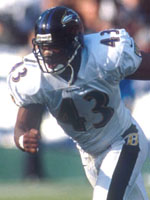 |
|
Dex played for the Super Bowl champion Baltimore Ravens |
The Cavalier legend eventually moved up as a full-time assistant coach as the running backs coach and learned the offensive side of the ball. During his time on Groh’s staff, Poindexter helped coach several great UVa running backs such as Cedric Peerman , Jason Snelling, Wali Lundy and Alvin Pearman. While he had little experience coaching that position, it was easy to see why that group played so tough over the course of those years. Dex coaches much the way he played, with incredible intensity and passion. It’s tough not to let Dex rub off on you. He’s infectious that way, and it certainly translates into how his athletes play.
When Groh was dismissed just after the 2009 season, Poindexter and coach Bob Price were retained by the athletic department to hold down the shop and save the recruiting class during the transition from old coach to new. During the months leading up to Coach Mike London’s hiring, Poindexter was uncertain of his future and where, if anywhere, he might be coaching next. While other dismissed coaches were out finding jobs, Dex was in limbo and wondering how he and his family would fare. What made it equally tough was that he was getting phone calls from other schools offering him nearly twice what he was making as a running backs coach. But he stayed the course and never wavered on his commitment to Virginia and its efforts to keep the recruiting class secure. He said ‘no’ to all offers, instead hanging on and hoping that his days at Virginia would continue.
Fortunately, Poindexter was retained when friend and mentor Mike London was hired. Dex didn’t believe London owed him a spot, so he was quite relieved when he was told he’d be one of the members of the new coaching staff. London went on to hire a number of assistants who all fall in the same mold as Poindexter; enthusiastic, passionate, motivated, and most importantly, great people.
Coach Poindexter is currently coaching UVa safeties, the very position that he played so well during his Cavalier career. The long-time Hoo understands the challenges of getting Virginia football back to national prominence, but there’s no place he’d rather be. Poindexter is already making a mark with the new staff. He’s helped bring in some of the program’s best recruits for the 2011 class, a class which most services rank in the Top 20 nationally; it includes 5 players from ESPN’s Top 150 recruits. ESPN.com also tabbed Poindexter as one of the nation’s Top 20 recruiters, although he is quick to suggest it’s a team effort with his staff and the award is more deserving of their combined efforts, and not that of just his own.
When reading the interview below, it’s easy to understand why Dex didn’t leave Virginia early for the NFL, never left Virginia to save his own career during the coaching change, and has no aspirations of leaving anytime soon. He cares deeply for UVa and he sees Charlottesville as his home, a place where he wants to continue to raise his family. His loyalty runs deep; whether it be toward family, past or current coaches, past or current players, and certainly the friends he has met throughout this journey. Always a great personality, and always approachable, Poindexter is what is right about UVa athletics. And with Coach London hiring a staff with many of the same traits, Virginia football is in a position to become relevant again. It starts with the right attitude, something that Anthony Poindexter certainly has.
Enjoy the interview.
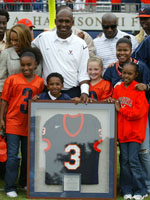 |
|
Poindexter with family and friends as his jersey is finally retired in 2010 |
 Mike: You’re a high motor guy with a great attitude and the ability to lift up others to perform well in the face of adversity. You’ve had your own share of adversity as well. From where or to whom do you attribute these traits? What keeps you motivated?
Mike: You’re a high motor guy with a great attitude and the ability to lift up others to perform well in the face of adversity. You’ve had your own share of adversity as well. From where or to whom do you attribute these traits? What keeps you motivated?
DEX: It comes from my parents and my grandparents. When you grow up you pick up a lot of stuff [from your family]. My dad had to go through a lot of stuff; losing his father, losing two brothers, becoming the man of the house when he was 16. My grandmother, who raised him, had back cancer for a number of years and never really said anything. Both my grandfathers were dead before I was born. My other grandmother just passed this past season. She had to take care of an autistic son. One of my uncles had a drinking issue and had two twin sons that she raised.
I just watched how they handled it, always persevered through things. A lot of my attitude came from how I grew up.
 Mike: Did their struggles help provide you with the motivation to succeed and overcome obstacles of your own?
Mike: Did their struggles help provide you with the motivation to succeed and overcome obstacles of your own?
DEX: Life is short. Like most kids I wanted to go pro. I wanted to be able to take care of my mom and dad so they didn’t have to work anymore. That was my main focus, through high school and through college. To a certain extent, even now, you want to take care of your folks and do nice things for them. Obviously I have my own family now that I have to take care of, but that’s kind of how my motivation went.
 Mike: You came on board as a G.A. from the NFL. How difficult was the transition for you, particularly as you were going from a higher paying NFL job to a much lower paying job as a Grad Assistant and having to get back into the collegiate mindset again by taking college classes?
Mike: You came on board as a G.A. from the NFL. How difficult was the transition for you, particularly as you were going from a higher paying NFL job to a much lower paying job as a Grad Assistant and having to get back into the collegiate mindset again by taking college classes?
DEX: Well, the transition wouldn’t have been as good … you know I have a very supportive wife, and my mother- and father-in-law really helped us out. I had two babies at that time when I first came back as a GA. It’s a big transition. Everybody thinks about the money, but it ain’t so much the money as it is the time. When I started coaching as a GA, I went from the NFL and being gone maybe three hours a day, if that, to going to a job where you’re working 16-17 hours a day. That’s the biggest difference. But it’s something that I love doing. I love being around the kids. That was my motivation, to be back at my home school and start my coaching career here. It’s fabulous.
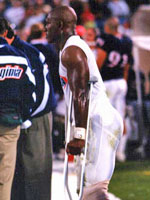 |
|
Poindexter during the second half of the N.C. State game before he knew the extent of his knee injury |
 Mike: You obviously had other opportunities in your life. Why did you decide to become a coach?
Mike: You obviously had other opportunities in your life. Why did you decide to become a coach?
DEX: Well, it’s just in me. When you first know you can’t play anymore … it’s like I still want to be around football. I got wind that Coach Groh was looking for former players that wanted to get into coaching. I put a call in and he called me back. It was like,”I’m going to bring you in for an interview and sit down and talk with you.” Obviously, Al Golden was here, Coach London was here. Some guys I knew … Bob [Price] was still here. So they kind of knew me although I didn’t know Coach Groh well. I played with Coach London’s brother Paul in college, so I knew Coach. It was just one of them things, I want to coach. Came back and just fell in love with it. Still here to this day, knock on wood.
 Mike: What benefits, if any, were there for you to start with running backs, and did you enjoy the process?
Mike: What benefits, if any, were there for you to start with running backs, and did you enjoy the process?
DEX: I think it was a great benefit to be on the offensive side of the ball, which I had never been on at a higher level. Last time I played offense was in high school. Really, when I got back here and started doing the offensive stuff, the defense made more sense to me. You know, how they call things, how they run things. So I’m looking at it from the offensive perspective and thinking, “OK, when I was playing defense, this was what they were trying to do to me.” That really helped. Now when I transitioned over I got a feel for how the offense is trying to attack and why they want to attack in this way. If we line up like this, how they’re going to attack us. It really benefited me a lot.
 Mike: Was putting you at running backs a conscious decision to help you grow as a more well-rounded coach, or do you think it was more a placement of need for the team?
Mike: Was putting you at running backs a conscious decision to help you grow as a more well-rounded coach, or do you think it was more a placement of need for the team?
DEX: In coaching, because you have to understand that you can play defensive back and not be a great defensive back coach. And unless you know the ins and outs of the coverage, the defensive front and all of that kind of stuff, it’s hard to make the transition. You’re coaching four guys and two of them, the safeties, are totally different than the corners. It’s a big responsibility for any coach to be the secondary coach. I’m not saying running back coaching ain’t an important job, but it’s an easier transition when coaching.
A lot of people say, “If you played this position, why would you coach a different position?” Well, coaching is just like anything, you learn. You might be an Anthropology major, but if you want to be a banker, you go out and learn how to become a banker. Whatever it is, you learn how to do the job. You know, I had background in football, and starting with running backs was a great experience. I really liked it.
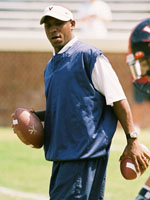 |
|
Coach Dex started his coaching career working with running backs |
 Mike: Why do many coaches get their start coaching running backs or receivers? Is there something about those positions that make it easier for first-time college coaches?
Mike: Why do many coaches get their start coaching running backs or receivers? Is there something about those positions that make it easier for first-time college coaches?
DEX: I think you’re dealing with less people, for one. Most of the time you have one or two backs in the game at once, and maybe three receivers but they’re basically off a route tree. You hate to say it’s an easier job and minimize [the worth of] that position, it’s just an easier transition into coaching.
[For instance] the O-Line coach is a very important job. He’s got five guys that have to know exactly what they’re doing all the time or the play just ain’t going to go. Obviously, the quarterback, a very important position to coach. Basically, you win or lose games based on how well the quarterback plays. Again, the secondary. The secondary is a tough job. People score points if your secondary ain’t in sync.
 Mike: Has the game changed at all since you played? If so, talk about how it has changed in terms of player preparation as well as coaching of the athletes and routine.
Mike: Has the game changed at all since you played? If so, talk about how it has changed in terms of player preparation as well as coaching of the athletes and routine.
DEX: I hate to sound like an antique, but I’m pretty sure guys would say the same thing when I was a young player, in terms of how much the game has changed. It’s like anything; the world changes, society changes, technology changes. … You look at football now, it ain’t the old school, smash mouth football as much anymore. People spread people out, it’s more wide open like a fastbreak game.
The kids want to get the coach more. When I played I was scared to come talk to my coaches half the time.
 Mike: Coach Welsh?
Mike: Coach Welsh?
DEX: [laughing] Yeah, well not many people wanted to talk to Coach Welsh. It was just … it’s different now. Kids are coming in and out of our door all day. I can count on one hand the number of times I was on this side of the building as a player here. I just think the relationships you have with your players is a lot different. You know, I loved my coaches in college. But to an extent I feared them, too. I think that fear factor is out of kids. They don’t get coached like that when they’re young, that the coach is the top dog. Now, this is how society is. The parents have so much input. When I came up the parents handed their kids to the coach and whatever the coach said, went. No questions asked. Nowadays kids ask more questions, but they have more resources to get knowledge. So if you ain’t on point, they’re going to question you because they can go find the answer. They’ll look on the Internet or Facebook or whatever.
I’m not saying it’s changed for the bad or changed for the good. Just like anything, times are changing and coaches have to change with the times.
 Mike: Talk about the change in coaching staffs and your nervousness or confidence in job security. What was going through your head when you knew Coach Groh was leaving?
Mike: Talk about the change in coaching staffs and your nervousness or confidence in job security. What was going through your head when you knew Coach Groh was leaving?
DEX: It was tough. After we played the [Virginia] Tech game … well, for three years there had been rumblings [about Coach Groh]. That final game after Tech we came in that Sunday and you kind of see Coach Groh packing up his stuff, so you know something is about to go down. It’s tough, it’s tough. Everybody looked at me like, “You played here, you know …” But that didn’t make me feel any better, man. It’s different than playing here. Nobody owes me anything here, in my opinion. I played here. I did the best I could here. And they gave me four or five great years here. When you come back and you start coaching and you’re in this kind of business that … we all know when you get in that it’s a business of winning. No matter what anyone says, it’s a business of winning. And we just didn’t win enough.
But it was stressful. You’ve met good friends. That staff … I was close to Coach [Groh]. Coach Groh means a lot to me. He got me into this business. He taught me. He groomed me. Whatever I needed … he walked me through the steps of becoming a coach and doing it the right way. So it’s tough. Selfishly, you want to think about your family. But when you’re with [other coaches] and the time we spent together … you know their families, their wives, their kids … you know, it’s a lot of people that are getting disrupted when that stuff happens. Fortunately I was able to stay. Maybe it was tougher that I got to stay, in some sense, than if I had been let go. Obviously I wanted to stay, but when you’re looking at your fellow coaches and the families who were uprooted and the situation they had to go through … it’s just a tough situation.
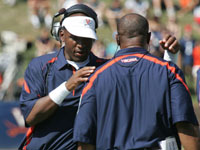 |
|
Dex with friend, mentor and now head coach, Mike London |
 Mike: When you were retained temporarily along with Bob Price during the coaching search, you were offered positions at other schools. As you weren’t sure the new coach would retain you, what made you decide to decline those offers and stick around even though Coach London was not yet hired?
Mike: When you were retained temporarily along with Bob Price during the coaching search, you were offered positions at other schools. As you weren’t sure the new coach would retain you, what made you decide to decline those offers and stick around even though Coach London was not yet hired?
DEX: Well, I mean, this is my place, man. You know, a lot of people don’t think like I think in this coaching business. I always looked at it like, what better place to be able to coach than the place you went to school, the place that had done so much for you, and a place that you believe in? So when I walk into a school and talk to a kid I’m not talking about something I read in a manual, I’m talking because I’ve lived it. I know what the place has done for me and how it can help you. What a great place. Sometimes you get offers to go places and get more money, but money doesn’t always equal happiness. What place in America would you rather raise a family than Charlottesville, Virginia? But that’s just me. I mean, there are some nice places out there. I’ve been to a lot of nice places, but I know this place. This place is a big part of me, no matter what happens to me in my career.
 Mike: Did you get any insight into what might happen to you with the new coaching hire? Obviously any head coach can come in and clean house. Did you get any feedback from administration that you would at least be pushed for an interview with the new coach?
Mike: Did you get any insight into what might happen to you with the new coaching hire? Obviously any head coach can come in and clean house. Did you get any feedback from administration that you would at least be pushed for an interview with the new coach?
DEX: Well, you hear things in-house. But I’m sure when the AD is in the hiring process, they can’t come down and say, “You’re going to have this job.” I mean, what head coach is going to accept that in a job of this magnitude? Our contracts aren’t like 10 years where they have to buy out the assistant coaches, so they don’t have to keep you. It was nip and tuck, but you have to fall on your faith, fall back on your family … you fall on the [premise] that you’ve done things right the right way, tried to do right by people, keep yourself clean, do the right things in the community and stuff like that … but I’m in the business where there’s change. If you’re in this business and you’re not willing to make the change, then you’re in the wrong business. It’s the reality of it.
When you go through this you learn a lot about yourself, a lot about the people around you. Things happen for a reason. I’ve had disappointment in my life. The way I grew up, never had much of anything. I went from projected as a first round [NFL Draft] pick to blowing my knee totally out and falling to the 7th round. Then going to Baltimore and winning the Super Bowl … a high. Then getting cut the next spring … low. Go to Cleveland, make it to the last cut, then got cut. So I had letdowns, it wasn’t like, “What am I going to do?” I’m the type of person that I’m going to keep positive on anything. I’m going to keep moving. If you keep that kind of attitude, you keep moving.
 Mike: Did you have any idea that Coach Mike London was the lead candidate for the job?
Mike: Did you have any idea that Coach Mike London was the lead candidate for the job?
DEX: I had no idea. You heard Coach London, Al Golden, the guy at Boise, all kinds of stuff.
 Mike: When London was hired, how soon before you knew you’d be retained? You obviously had a relationship with him for many years. Did you feel when he was hired your job was basically safe at that point?
Mike: When London was hired, how soon before you knew you’d be retained? You obviously had a relationship with him for many years. Did you feel when he was hired your job was basically safe at that point?
DEX: When Coach got hired he called us. We were on the road recruiting for him. I basically learned I was going to be retained when he interviewed me. Me and Coach had a good relationship, but I didn’t want to put pressure on him and say, “Hey coach, you need to keep me.” Hey, he’s got to build his staff anyway he feels like he’s got to build it. But I had been with him for a long time so coach knew what kind of person I was, he knew what kind of coach I was, and he basically was my mentor. He’s been my mentor every since I went into the business. I bounced things off of him, “What do you think here, what do you think there?” and, so, we already had a relationship. I didn’t call him and ask him what he was going to do. He’s a good man, has a big heart, and I didn’t want him to feel like he had to keep me because we’ve got a good relationship.
 Mike: You have a passion for the sport, both with playing it and now with coaching it. London is also a very passionate coach. Talk about the similarities in attitude and approach to coaching you have with him.
Mike: You have a passion for the sport, both with playing it and now with coaching it. London is also a very passionate coach. Talk about the similarities in attitude and approach to coaching you have with him.
DEX: I’ve been around Coach for a long time. We’re both positive people. We’re both high energy. We both love coaching and being around the kids. We love our community. When you’re a college coach, you have to love your community and be accessible to the people in the community – because they want to be a part of it. For me I had already been a part of this community as a player. I tried to do the same things when I played, I wanted to be out there. Not trying to yank my own chain or get pats on the back, but if I’m going to be living here and little kids come to the game, what it’s to me to go to their school and play around with them for a while? Now they feel when I run out of the tunnel, that they know this guy, “I really do know him. He’s a real person to me.” I think that’s part of it. Me and coach see a lot of things the same way.
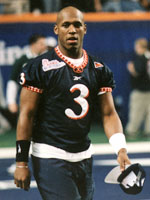 |
|
Dex pregame during the 1998 Peach Bowl |
 Mike: Rewind back to the bowl game in 1998. You were injured and unable to play in the game, so in a sense you were on vacation. You were at the hotel restaurant and about ready to leave to go out with friends when a number of Virginia fans came into the restaurant. Instead of leaving, you stuck around for about two more hours meeting and greeting with the fans, probably hearing over and over how sorry they were about your injury, yet you stuck around and made people feel like each and every one of them was important. A lot of high profile athletes sign a few autographs and duck out. And after 10-15 minutes, I doubt anyone would have cared if you did the same. So why stay?
Mike: Rewind back to the bowl game in 1998. You were injured and unable to play in the game, so in a sense you were on vacation. You were at the hotel restaurant and about ready to leave to go out with friends when a number of Virginia fans came into the restaurant. Instead of leaving, you stuck around for about two more hours meeting and greeting with the fans, probably hearing over and over how sorry they were about your injury, yet you stuck around and made people feel like each and every one of them was important. A lot of high profile athletes sign a few autographs and duck out. And after 10-15 minutes, I doubt anyone would have cared if you did the same. So why stay?
DEX: You just have to understand, no matter how good you are and how high you are on top of the chart, you’re not always going to be a football player. That night, for me to hang around with people, I like doing that. I don’t mind having a conversation with people and having a good time, seeing people smile. It ain’t for show, and we didn’t really have any place we needed to go. And when you think about the money people have spent to come see you play, whether it’s one time they came because it’s all they could afford, or season ticket holders … wherever they fall, these people have paid their hard-earned money to come watch you play. That’s part of the reason I played the way I played. You don’t know if someone that’s coming to see you play is the only time they’ll see you live. You lay it all out there – every game you play the same way. You do it obviously because you want to win, but people are what make you. You don’t make yourself. That’s what a lot of guys don’t understand, pounding your chest, “I’m the guy.” Well, you look up and you’ve turned a lot of people off and you’re standing there by yourself.
 Mike: I guess Keith Payne didn’t necessarily come in with your philosophy, but was able to turn it around pretty well with your help and that of Coach London. He righted the ship eventually, but it seemed to take a while for him to ‘get it.’
Mike: I guess Keith Payne didn’t necessarily come in with your philosophy, but was able to turn it around pretty well with your help and that of Coach London. He righted the ship eventually, but it seemed to take a while for him to ‘get it.’
DEX: Keith’s a good kid, man. He’s always been a good kid.
 Mike: Glad he got to go out the way he did. He came back, earned the respect of his teammates, and was able to have a successful final year. He came in with so much hype that it was nice to see him show us what it was all about, even if it was for just one season.
Mike: Glad he got to go out the way he did. He came back, earned the respect of his teammates, and was able to have a successful final year. He came in with so much hype that it was nice to see him show us what it was all about, even if it was for just one season.
DEX: Fans got to understand now, the media makes these kids like “these gods” and sometimes the light doesn’t turn on. Like Keith, it took four years for the light to turn on. College is a different game.
 Mike: You’re one of the key recruiters for athletes in the state of Virginia. What’s it like being in-home with recruits when it wasn’t that long ago that it was just the opposite? Is it easier to relate to them, particularly as you were once a big-time recruit in the state?
Mike: You’re one of the key recruiters for athletes in the state of Virginia. What’s it like being in-home with recruits when it wasn’t that long ago that it was just the opposite? Is it easier to relate to them, particularly as you were once a big-time recruit in the state?
DEX: Well, first off on the recruiting. I do a certain area, but you have a lot of help. It comes from your whole staff. The bottom line, it comes from your head coach. The Coach is who these kids come to play for. You understand that. The area I’ve been [recruiting], I’ve been doing that for almost four years, so you’ve built relationships with kids you’ve been seeing for so many years. This year was kind of the perfect storm for me with recruiting.
As far as going into the house, I try to make it like I’m going to my aunt’s house or uncle’s house. I’m not uptight with it. To me, coaching, recruiting … it’s all about relationships … people feeling good about you. For a parent to say they want their kid to come play for you, they have to feel good about you. They have to feel like you’re a genuine person. You can’t just go in there with a bunch of rehearsed statements and … well, maybe that’s just me. Maybe you’re supposed to go in there with rehearsed statements or whatever. I just try to take the conversation wherever they want to take it and give them whatever time they need.
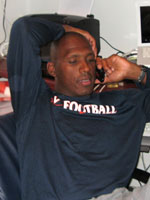 |
|
Dex working the phone in his McCue Center office |
 Mike: London’s approach seems to be more about a better fit for athletes here rather than to grab a kid just because he can score a lot of touchdowns. UVa appears to want to recruit a certain type of athlete here. Talk about the screening process and how you guys are able to weed through which kids would work out and which ones might not?
Mike: London’s approach seems to be more about a better fit for athletes here rather than to grab a kid just because he can score a lot of touchdowns. UVa appears to want to recruit a certain type of athlete here. Talk about the screening process and how you guys are able to weed through which kids would work out and which ones might not?
DEX: You try to talk to them within the rules of when you can contact them and learn about them. You just try to learn about who the kid really is. He might say, “Coach, how many minutes?” Well, they’re young. That’s a question someone probably told them to ask, or because another recruiter said, “We’re going to give you this many minutes.” Or “this ain’t a big town.” Well, some schools are in cities. This place ain’t for everybody. But, you try to find out who the kid is and is he really a good kid at heart … is he achievement oriented, does he have drive to succeed, and is he motivated? Not just on the football field, but in the classroom and in the community. You try to put it all together. If it fits it fits, if it don’t it don’t. There’s enough good players out there that fit, and right around in our area; Virginia, Maryland, D.C., North Carolina. There are enough guys where this appeals to them – good football players that see past their football careers. “Hey, I’m going to Virginia. I can get the best of both worlds here. I can play football, but how long is this going to last?” And a lot of guys don’t want to go that far from home.
 Mike: You’re a relatively young coach and you had your share of success on the football field. You were recruited pretty hard as a high school player. Do you think that gives you and advantage when approaching recruits?
Mike: You’re a relatively young coach and you had your share of success on the football field. You were recruited pretty hard as a high school player. Do you think that gives you and advantage when approaching recruits?
DEX: I think it’s more the personality of the coach. You don’t have to have been an All-American player to be a good recruiter. You don’t have to be a former NFL player. It’s about the person you are. Don’t try to be the person that you’re not. I am who I am. I always tell them, what you see right is what you’re going to get when you get to school here with me. So it ain’t like I’m putting this smiling face on for you right now. I’m going to tell them the truth, “This is what I expect of you.” I’m going to love ’em up, because I do love my kids up. But at the same time, if I’ve got to put my foot in their hind pocket, I’m going to. That’s the same with all of our coaches. I think it’s about how you present yourself. Nowadays, I think a lot of these kids can read through if you’re trying to be something you ain’t. Be who you are. That’s my philosophy. I think the product I’m trying to present to them – I don’t try to say ‘sell,’ I say ‘presenting’ it to them – is the best out there. That’s just my opinion, but I’ve lived it.
 Mike: But that does give you some perspective. You’re a big-time football player who came to Virginia and helped elevate a program. Granted it was a solid platform when you got here, but you guys moved it up a notch when you got here. Do you draw from that at all when talking to recruits?
Mike: But that does give you some perspective. You’re a big-time football player who came to Virginia and helped elevate a program. Granted it was a solid platform when you got here, but you guys moved it up a notch when you got here. Do you draw from that at all when talking to recruits?
DEX: Well, you do sometimes. But you hate to … I’m not the type of person to tell these kids [about my career], and Shawn ain’t either. If you look at Virginia football, [from the mid 80’s] through 2007, we were winning a lot of games. Did we win all of the big ones? No. But we were winning eight or nine games a year. I always tell kids that we aren’t starting the program from scratch where it’s been totally dormant … or this team ain’t won in 20 or 30 years. The structure is here, we just have to remodel a little bit. That’s how I approach it. Every now and then you can go back down memory lane, but those kids don’t know who we were. They were babies.
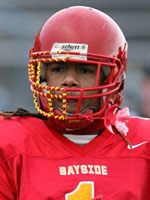 |
|
Dex was instrumental in the recruiting of Virginia state player of the year Demetrious Nicholson , one of true first year’s who may get a chance to play in 2011 |
 Mike: Your staff recently signed a large number of kids from the state of Virginia, 13 of TheSabre.com’s Top 25. Why is it important to recruit well in the state of Virginia?
Mike: Your staff recently signed a large number of kids from the state of Virginia, 13 of TheSabre.com’s Top 25. Why is it important to recruit well in the state of Virginia?
DEX: Well, because we’ve got good players in the state of Virginia. I tell people all of the time, that if us and Virginia Tech split on the best players in the state, the top 30 players in the state every year, both programs would be really good programs. We’re fortunate in the state of Virginia that we have really good high school football. The coaches do a great job coaching the kids. We get size, we get speed, and we get athleticism out of the state. Obviously, the 757 (Tidewater region) is a highly populated area – there are a lot of kids that come out of there. You look at this whole state – you think about Richmond, Southwestern Virginia, Northern Virginia – there’s players all around here. If you can try to keep them within the borders, and then supplement your class from out of state, you’re going to have good classes.
 Mike: Recruiting out of state takes more time for travel and you can’t get the kids to see your school as often as in-state kids. To be successful in college football, you have to rely mostly on your in-state talent, correct?
Mike: Recruiting out of state takes more time for travel and you can’t get the kids to see your school as often as in-state kids. To be successful in college football, you have to rely mostly on your in-state talent, correct?
DEX: Obviously. Everybody tries to control their own state. Florida tries to control Florida, Georgia tries to control Georgia … you name big schools in big states that have good football … like Southern Cal and UCLA – they get a lot of their kids from California. For all the reasons you said; I mean, the kid can get to see you more often. A kid comes from the 757 and it’s just two hours to our school. Basically we’re in the center of the state, so the farthest you’re going to have to drive is four hours to get to us. That’s a big benefit that we have. The more times they get to see you, the more comfortable they feel with you. It begins a good relationship. You start getting these kids when they’re in the 9th and 10th grade to come see you.
 Mike: You were recently named one of the Top 20 recruiters on ESPN.com for your work with this class. Do you feel a sense of accomplishment for the recognition?
Mike: You were recently named one of the Top 20 recruiters on ESPN.com for your work with this class. Do you feel a sense of accomplishment for the recognition?
DEX: I can’t say I recruited all of those kids by myself, something like 10 I signed. Obviously Shawn helps me in that area [Maryland/NOVA]. The days I couldn’t go out, he would go see the kids. Again, our head coach and the other coaches on the staff … I just think we did a good job with these kids. When they get on campus they felt good about what we had to offer. My name was just in that area. I don’t ever want to be patted on the back, because there are going to be years you get some and years you don’t. It is a good honor? Yes. Obviously my name is behind it, but I’m not that guy. I think it’s more an honor for our staff and how recruiting went this year [for Virginia], than for me personally.
 Mike: But you have to admit, it’s nice to get the honor to help you recruit nationally, even though the rest of the staff wasn’t mentioned as part of it.
Mike: But you have to admit, it’s nice to get the honor to help you recruit nationally, even though the rest of the staff wasn’t mentioned as part of it.
DEX: Oh, no doubt. We know how to recruit. We’ve got a good product that we’re offering here. We’ve got good guys here, guys with character. We don’t do any underhanded stuff. You can do it the right way and get good players. [The award] is nice, it’s really nice, but I don’t know what I’m going to do with it. I can hang it on my wall but it ain’t going to win any games for us.
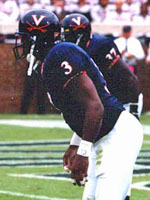 |
|
Dex will always be considered one of the greatest UVa players of all time, and one of the nation’s very best safeties |
 Mike: Do recruits have awareness of Dex the player?
Mike: Do recruits have awareness of Dex the player?
DEX: They have no clue [laughing]. They have no clue. Most of the guys that I’ve coached don’t know, until people say something. Now they’ll go online and Google you. And they be like, “Damn, coach, I didn’t realize that …” And this video a couple of players watched and were like, “You could play,” and I’m like, “I could play a little bit, you know.” You don’t expect them to [know].
 Mike: Talk briefly about the 2011 recruiting class and what it means for the future of UVa football and your efforts to build the program back to a level of prominence.
Mike: Talk briefly about the 2011 recruiting class and what it means for the future of UVa football and your efforts to build the program back to a level of prominence.
DEX: I just think it’s the building block. Recruiting is the life line of winning. You get good players and it makes you look like a good coach. If you get guys that can just play, they make you look like a good coach. Sometimes they make plays that people in the stands are like, “Wow, that’s an amazing play.” Well, 9 times out of 10 the coach hasn’t taught him that action, he’s just got it in his body – he’s a great player. With this class, hopefully it will build on the 2012 class, and it just starts snowballing. Guys want to come here because they know a good class has come in. You get guys like Trey Nicholson and Dominique Terrell out of the state – two high profile guys – and now the next high profile guy in the state says, “Hey, they went there. Maybe I want to go there.” Then you get some high profile guys out of Maryland and they think there must be something going on there, something special going on there. You just gotta keep building up and hopefully it will snowball that way and we can keep it moving.
 Mike: How has recruiting changed since you were recruited?
Mike: How has recruiting changed since you were recruited?
DEX: Now there’s just so much social media, you know Facebook, Twitter, and even email. All the kids with the technology, that’s the biggest difference. When I was coming through, there was no email, no Facebook, no computers, and no Rivals.com. Basically your high school coach sent out a tape. It was mostly regional kind of recruiting. Now kids become national recruits and it ain’t so much because of their play – they’re now accessible to anybody. You can be out in California and look at a kid in Virginia just as easily as being in the state. I think that’s the biggest change.
 Mike: Do you see is as an advantage or disadvantage with regard to today’s technology and trying to coach and recruit?
Mike: Do you see is as an advantage or disadvantage with regard to today’s technology and trying to coach and recruit?
DEX: It’s just a change in the times. That’s society now, so you have to move along with society. With certain kids it’s a benefit to get more exposure. I think more kids are probably getting offered now, or getting major Division 1A scholarships because of it. It ain’t just the local schools, it’s people all across the country. You just deal with it and adapt and keep moving.
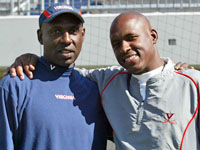 |
|
Shawn and Anthony, two of UVa’s most memorable athletes and now coaches, have become close friends over the years |
 Mike: Talk about the areas that you might share with Shawn Moore. Do you guys have overlap with some recruits?
Mike: Talk about the areas that you might share with Shawn Moore. Do you guys have overlap with some recruits?
DEX: Shawn does D.C. and the eastern part of Maryland, and I do Maryland and Northern Virginia. He also has part of Northern Virginia, so we cross over a little bit. I had been in there and done all of those schools [as part of Groh’s staff], and he lived up there, so it was a good mesh. He knows a lot of people up there and I know a lot of people up there. We try to get together anytime we can so that we have two UVa alums walking through the door representing the program.
 Mike: Did you know Shawn pretty well before he was hired as an assistant?
Mike: Did you know Shawn pretty well before he was hired as an assistant?
DEX: Shawn used to come back when I was in school here, so I met him then. I didn’t really know him that well, but over the years when I came back to coach we started to build a good relationship. Then I was recruiting St. Albans where he [administrator], so I would go up there and eat breakfast with him, chit chat with him. I got to know him a lot better when I started coaching.
 Mike: People have stated you and Shawn have become pretty good friends since he came here to coach. Talk a little about your relationship with Shawn. Someone said you tried to buy a house close to him so you could ride bikes to work together.
Mike: People have stated you and Shawn have become pretty good friends since he came here to coach. Talk a little about your relationship with Shawn. Someone said you tried to buy a house close to him so you could ride bikes to work together.
DEX: Nah [laughing], I didn’t move because of Shawn. You know, we come from basically the same areas. He’s from Martinsville, I’m from Lynchburg. We have the same kind of upbringing and roots. You know, you meet Shawn and he’s easy to get along with. We have the same kind of personalities. He’s just a good guy. It helps that both of us went here, we know the tradition here and how things work here.
 Mike: Since you each played at a time when Virginia was at its best (1990 and 1995 respectively), do you guys ever share collegiate football stories and memories or compare your eras?
Mike: Since you each played at a time when Virginia was at its best (1990 and 1995 respectively), do you guys ever share collegiate football stories and memories or compare your eras?
DEX: I don’t think you can compare the two eras. We do share a lot of stories, but they get fabricated as we get older. But we do share a lot of stories. You know, Shawn’s teams were great. The teams he played on here were great teams. I’d like to think I played on some great teams here, too. I don’t think you could compare the teams. They were two totally different styles of teams. They were putting up 40-something points per game. They led the country in offense. We had a lot of great offensive players, but we were built around playing good defense. At one point we had the longest interception streak in the country. It was kind of two different styles of how to win the game. Even though we did have great backs in Tiki Barber and Thomas Jones we didn’t put up those kind of points.
 Mike: Did you come to UVa much as a kid and did that influence your decision to play here?
Mike: Did you come to UVa much as a kid and did that influence your decision to play here?
DEX: I came to UVa when I was in kindergarten with one of my best friends. His dad brought us up here to one of the basketball tournaments at U-Hall. I didn’t visit UVa again until I came on my official visit. But it was UVa, it was a state school. For me, it came down to UVa and Virginia Tech. I think I chose the right place.
 Mike: What about games on TV. Did you watch Shawn Moore, Herman Moore and Chris Slade on TV?
Mike: What about games on TV. Did you watch Shawn Moore, Herman Moore and Chris Slade on TV?
DEX: Well, it wasn’t like Virginia was on TV every week. You saw a few of them, but it ain’t like TV now where you can see UVa anytime you want to see them. You grew up watching Notre Dame, Southern Cal, Michigan, Penn State – you grew up watching those games. I watched Shawn Moore and Herman Moore and obviously I knew who they were and what they were doing there. But I can’t say that’s the reason that sparked me to come to Virginia.
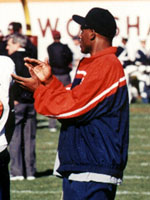 |
|
Poindexter on the field encouraging his team during their improbably comeback against Virginia Tech in 1998 |
 Mike: So, which team was better, the 1990 team with Shawn or the 1995 team with you?
Mike: So, which team was better, the 1990 team with Shawn or the 1995 team with you?
DEX: It’s hard to say what would have happened if those teams had played each other. On my end, thank goodness we didn’t play against a team that could throw the ball and put it up like that. And probably for them – at one point, in ’96, we had five guys drafted [into the NFL] off that defense. And with the exception of four or five players, all of the players off that defense got drafted at some point in their careers.
It’s hard to say, we don’t ever get into that part. It’s good that way. You have to respect what they did. For me it was like picking up the torch after it’s already been lit and carrying it on. That’s what you try to tell kids. We’re not rebuilding this program – this program was built a long time ago. You’re just trying to get it back to what it used to be.
 Mike: What do you remember most about your HS state championship game against Matoaca and future teammate James Farrior?
Mike: What do you remember most about your HS state championship game against Matoaca and future teammate James Farrior?
DEX: The first year we played Farrior, when he was a senior and I was a junior, we beat them 35-14 down there. So we worked them out pretty good. We had been to Nottaway the year before and lost in the State Championship – we were 13-0 and ended up losing in the State Championship. We got back [to the State Championship game] and had to go on the road again and played Farrior [and Matoaca] – they had a great team and a great quarterback. It was good because we got a chance to win our first one and finally got over the hump. Then the next year we ended up playing them again [without Farrior]. Then they had Thweatt. Thweatt was a young player on the team and we ended up beating them 21-14. We had to come back – we were down 14-7 at half time. Both games were great. Matoaca was a competitive team. I cherish those high school memories. They were right up there at the top with anything I’ve ever done, even the Super Bowl win – they’re right up there at the top. I had a lot of good teammates, and I’ve been fortunate all the way through [high school, college and pro] – to have good teammates and good coaches to help me along.
 Mike: As a recruit, what made UVa an appealing choice for you?
Mike: As a recruit, what made UVa an appealing choice for you?
DEX: Coach Wilmer. Danny Wilmer was amazing. He’s still … I still talk to Coach. He was there when I got my jersey retired at Jefferson Forest. He was there for my jersey retirement [at UVa]. It’s hard to explain. Unless you’ve been recruited by him, it’s hard to explain. He recruited a lot of us, a lot of good ones.
It was that, and when I walked here on this campus and got around the players – I’ll never forget it. Me and Shannon Taylor was on our visit together. We were staying over at the Boar’s Head. We went out with the boys that night and got back to the room and thought, “Man, we’re coming to Virginia.” I’ll never forget it. We were roommates and like, “We’ve got to go to Virginia.” It was just something about this place – something about the people we were around, and the guys we were around that said that I’ve just got to come here.
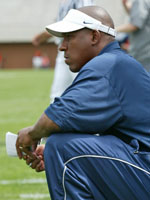 |
|
A focused Coach Dex |
 Mike: Was there anything about Virginia, on or off the field, that surprised you after you enrolled here?
Mike: Was there anything about Virginia, on or off the field, that surprised you after you enrolled here?
DEX: Well, coming from a small town – basically it was a one horse town when I grew up – just how big [Virginia] was and the class size, stuff like that. How Coach Welsh ran the practice. I was used to practicing a long time, but they [Virginia] was on strict times. My high school coach would say, “Do it again, do it again” until we got it right.
I don’t know if anything surprised me, man [pauses] – the surprising thing is how diverse the school is. It really broadened my horizons to see other things, to see other options, to see that people lived a different way than I grew up – 18 years living one way, just knowing it that way. Then you get here and you meet so many different people.
 Mike: Roger Mason Jr. once told me in an interview while he was at Virginia that the thing that surprised him the most was the diversity of the school and that the regular student body treated him like a student and not an athlete. He was not expecting that.
Mike: Roger Mason Jr. once told me in an interview while he was at Virginia that the thing that surprised him the most was the diversity of the school and that the regular student body treated him like a student and not an athlete. He was not expecting that.
DEX: I was up in Northern Virginia this week and saw a guy who was my suite mate [while at UVa] the first year. He wasn’t an athlete and we still have that bond – all of my suite mates, the first year students that we had here that we got to mingle with outside of football. I was able to embrace being part of the school and not just being an athlete at the school – the whole big picture of it. That’s what I wanted to do. I didn’t want to be singled out as [an athlete]. I wanted to be part of the school, fall in line with everything everybody else did. This school is set up that way. We don’t have a football dorm. Some [colleges] keep the athletes separate from everything else. Here, you’re in the real class. They force you to think. That was good for me.
 Mike: A lot of schools are moving toward athlete-only dorms. What’s your take? Is it a mistake for schools to move in that direction?
Mike: A lot of schools are moving toward athlete-only dorms. What’s your take? Is it a mistake for schools to move in that direction?
DEX: I don’t like to speak for what other schools do. I just know that being here and the way we put our kids with other kids who are here for school, and not here for just athletics, it helps you see what the real world really is. When you went to your suite, it was kind of a break from always talking about ball. Now obviously, once we moved out [of freshmen dorms] we all moved in with football players because our schedules were alike and we’re together all of the time. But I still go and see those guys. One of my best friends from high school came here to play baseball. So I roomed with a baseball player the first year. We were best friends since we were knee-high. His dad is the one that brought me here. After we moved out the first year, he moved in with baseball players and I moved in with football players. But we always hung out. I went to his apartment and he came to mine. We always stayed like that. Even with the other guys who weren’t athletes, you build bonds with them. It’s good to get away from football, football, football all the time.
 Mike: Sounds like it’s a better idea to mix athletes with the general student population as you build those social relationships that lead to other things in life, often times career opportunities outside of sports. Wouldn’t being put in an athlete box label a lot of kids and prevent those social networks from happening?
Mike: Sounds like it’s a better idea to mix athletes with the general student population as you build those social relationships that lead to other things in life, often times career opportunities outside of sports. Wouldn’t being put in an athlete box label a lot of kids and prevent those social networks from happening?
DEX: Well, I think a lot of times kids identify themselves as athlete-only, and it’s hard. At UVa its academic reputation speaks for itself. When you come to a place like this it would be sad if you walked out of here and all you thought of yourself was “an athlete.” It would be sad. I think the infrastructure of this place doesn’t allow it. You look at some of the best players we’ve had here – they all, for the most part, got their degrees. No matter how great their careers went in the NFL, they’re all out doing something. They can see the big picture of life.
 Mike: Is that one reason you can look back at your UVa career and not have regrets? You made a conscious choice to forego leaving for the NFL early and stuck around to finish up your degree and play another year, a choice that ended in knee injury that cost you a potentially long NFL career.
Mike: Is that one reason you can look back at your UVa career and not have regrets? You made a conscious choice to forego leaving for the NFL early and stuck around to finish up your degree and play another year, a choice that ended in knee injury that cost you a potentially long NFL career.
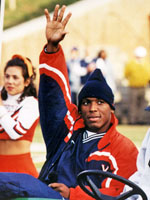 |
|
Dex was honored the final home game of 1998 against UNC |
DEX: One reason I can look back with no regrets is that I love this place. This place has done so much for me. I liked it here, it’s why I stayed – that’s the bottom line. I liked my teammates, my coaches – hell, I loved them. I love this place, I love being here, I love being in this community, and I just didn’t want to leave. I had another year, and we were supposed to be good, and we were – 9-2 that year and ended up losing in the Peach bowl to finish 9-3. But we had a great team. I knew we were going to be good. You know, things just happened. I look back on it that I made a decision to stay here because that’s what I wanted to do. No one told me to stay, no one told me to go. Everybody had their opinions, but at the end of the day I made the decision to stay.
 Mike: You were drafted as a baseball player for the Marlins while in high school. How much time did you invest in your decision to play college football rather than pursue baseball on a professional level?
Mike: You were drafted as a baseball player for the Marlins while in high school. How much time did you invest in your decision to play college football rather than pursue baseball on a professional level?
DEX: Oh, about five minutes [smiling]. I’ll never forget this day, sitting there at our kitchen table. I had already signed here and ended up getting drafted late by the Marlins. I told my mom, I said, “Mom, I’m not going to school. I’m going to go play pro ball.” And she said, “No you’re not.” Basically, she almost came to tears. She was like, “You’re not ready to be a man. You’re not going out there into the real world, you’re going to school.” For however long that conversation was, which wasn’t long, the decision was made.
 Mike: It’s great that you have that kind of respect for your parents, that you would heed their advice in that way. There are enough kids that do that, but there are probably more out there who don’t listen to their parents and take advice from others outside of their family.
Mike: It’s great that you have that kind of respect for your parents, that you would heed their advice in that way. There are enough kids that do that, but there are probably more out there who don’t listen to their parents and take advice from others outside of their family.
DEX: And the thing about my folks – and that’s why I love them to death – is that we didn’t really have a pot to piss in. And they could have jumped at whatever money people were going to give me, and it would have been more than they would have seen at one time – which wasn’t really going to be that much. Still, it probably would have taken three or four years to make that kind of money. For my mom and my dad to say, “Look, this is what you’re going to do. You’re going to get your education and we’re going to be OK.” That’s part of the reason I stayed in school when I had a chance to come out after my junior year. My folks weren’t looking for a handout from me, which they very easily could have. The way we were brought up, the situation we were in financially … they could have been like, “You need to go [pro] ’cause I need the help.”
 Mike: Did you ever seek to play two sports at UVa? Also, has focus and training on college football gotten to the point where it’s nearly impossible for an athlete to play two sports?
Mike: Did you ever seek to play two sports at UVa? Also, has focus and training on college football gotten to the point where it’s nearly impossible for an athlete to play two sports?
DEX: What convinced me from playing baseball here, or trying to do it, was that my best friend and roommate was playing baseball. In the spring I saw his schedule. I was like, “No way.” And I love baseball, don’t get me wrong. But, I was just out of football season where you play on the weekends and you’re at home most of the week. But he was traveling during the week, and then had three game sets on the weekend – he was hardly ever in the room. I was like, “Nah.” I wanted to feel some college while I was here. And to try to put baseball in with spring football? … I talked to Coach Womack plenty of times about coming out, he’d say, “Hey, you coming out?” I was like, “Nah, Coach, ‘not messing with it.”
 Mike: What tools must a college safety possess to become successful?
Mike: What tools must a college safety possess to become successful?
DEX: Understanding of football, vision – obviously you have to have some range, you have to be a good tackler, but a safety has to see. If he can see what’s in front of him and understand what’s happening in front of him … you don’t have to be the fastest guy to play safety, to be a great safety, you just have to be smart and you have to understand football. You’re basically the quarterback of the defense. I think that’s the vital part of being a safety. I always tell my kids that the Lord didn’t bless me with speed, and really didn’t bless me with a lot of strength, but I could see things. If they can do that, then I think they can play.
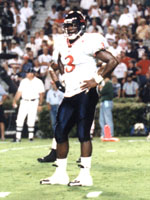 |
|
Dex during the 19-0 shutout win over Auburn in 1998 |
 Mike: I remember when you played as a freshman, you seemed to have great instincts for when it was run or pass and seldom got burned on a trick play.
Mike: I remember when you played as a freshman, you seemed to have great instincts for when it was run or pass and seldom got burned on a trick play.
DEX: Well, I remember one of them. It was against North Carolina. When I got here, the older guys taught me – Percy Ellsworth, Paul London … we had a lot of good of good DB’s. I’ll never forget Percy said, “You need to just learn how to read the line. They’re going to tell you run or pass.” That always stuck with me. In my high school days everybody ran the ball, so it was easy. We just played against the run. If it was a pass, it was an obvious situation for a pass. When I got here I had to learn how to read that. Once I got that down, it won’t no guessing. I might get beat on a ‘naked’ or something that looks like run. A lot of times I might have been burned, but I had corners that knew my style of play and they would cover up for me.
 Mike: We all know about the hard hits you put on opponents while at UVa. There’s a tale about you knocking Thomas Jones out during his first practice and standing over him saying “Welcome to college football.” What’s myth and what’s fact?
Mike: We all know about the hard hits you put on opponents while at UVa. There’s a tale about you knocking Thomas Jones out during his first practice and standing over him saying “Welcome to college football.” What’s myth and what’s fact?
DEX: Well, that myth with Thomas has grown for I don’t know how long. The truth is we had been in pads a few days, maybe. And the defense has certain tempos we run; full tackle, thud – thud is where you butt them up and you don’t tackle them, and you’ve got whiz – where you just whiz by them and don’t touch them at all. So, I guess Coach Welsh had gotten pissed off. It was supposed to have been a thud period and won’t nobody thudding. So he comes out and he starts ripping the defense, “I told y’all to thud, blah, blah …” So I was like, alright I got this thud. So they do a toss sweep to the right, my left, and I just ran down into the alley. And as soon as Thomas turned up into the hole I hit him square in the ear hole. And I didn’t know he was knocked out – I didn’t knock him on the ground. I thought he was trying to be a butt hole [because he was leaning up against me], so I pushed him aside and he just fell to the ground. I guess he got a little woozy. So George comes out – now I didn’t stand over him or nothing – and George comes out and starts ripping my ass, man. “You didn’t have to hit him like that!” He was all over me. So I got hot – I was like, “Yeah, but you told me …” So that’s basically how it happened.
 Mike: So he got knocked out, unconscious?
Mike: So he got knocked out, unconscious?
DEX: Oh, yeah. He got his bell rung. Now I don’t know he would tell the story, but that’s basically how it went. But I always loved T.J. I didn’t have a vendetta against him when he came in, like I’ve got to prove to this young boy that I’m … nah. Coach was getting hot at the defense, cause he said we weren’t thudding. Coach Welsh had never said anything like that to us. He was always on the offensive end of the field. So, when we went over there against the offense and he’s going to start ripping us, so I got pissed off.
 Mike: So was that your hardest hit in practice?
Mike: So was that your hardest hit in practice?
DEX: I didn’t even think it was that hard a hit, honestly. I always hit one way, so it’s normal practice. I can’t remember. It’s hard for me to remember the games and it’s hard for me to remember the practices. I do remember that, though.
 Mike: Talk about Coach London and the defensive staff, most of whom you’ve had previous ties to. What makes them a solid group?
Mike: Talk about Coach London and the defensive staff, most of whom you’ve had previous ties to. What makes them a solid group?
DEX: Coach London was my mentor when I first got into the business. I would always go ask him questions I would sit down and talk with him about how you do this or how you do that – recruiting, too. Coach London is a great recruiter. I played against Coach Reid when he was at Richmond. When I first got back into coaching, Coach Reid would come work our camps. We would always talk – he would talk about my playing days. I always had great respect for Coach Reid and how he carried himself. Anytime he talks, I always listen. He engages you. I think he’s one of the greatest speakers I’ve ever heard in my life. I really didn’t know Coach Hansen that well, but I knew him from recruiting. We had the same area in Northern Virginia. He was on the [Richmond] staff, so he knew me from my playing days. I had known Chip [West] for a long time – as soon as I got into coaching I met Chip, because he worked our camp every year. And I met Coach Brown when he was coaching high school. I was down in Atlanta – took Coach Groh down – and said, “Coach, there’s some guy here at the school that coached football and played for you in New England – I think his name is coach Vincent Brown.” And [Groh] was like, “Yeah, ‘The Undertaker.'” Then Coach Brown became a G.A.here. So I kind of have a connection with all of these guys. They’re good coaches. No, they’re great coaches. They know what they’re doing and they’re good people. They’re just good people to be around. Nobody’s got a lot of ego. We all try to help each other. Coach London lets us coach and it’s been good that way.
 Mike: What differences are there between the coaching styles of Coach Groh and Coach London as it relates to how the assistant coaches are handled and the level of responsibility you have?
Mike: What differences are there between the coaching styles of Coach Groh and Coach London as it relates to how the assistant coaches are handled and the level of responsibility you have?
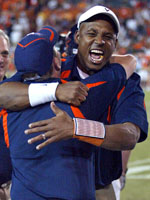 |
|
Dex hugs former UVa assistant Coach Borbley following the 48-0 win in Miami’s Orange Bowl |
DEX: Like I said, Coach Groh was really good to me. I wouldn’t be sitting in this chair today without Coach Groh. I still talk to Coach. I look at him as my father figure. He also gave me sound advice, good advice in anything I tried to do. He would always pick his phone up for me.
And Coach London has got a lot of Coach [Groh] to him. He was around Coach. He got a lot of core values of what Coach wanted in a program. They’re just two different people, though. I got Coach Groh at a different age than with Coach London. It’s hard to compare. They’re both really good people. Coach Groh didn’t treat me bad, so.
You know, this is my first gig. I’ve only coached for two coaches. I coached for Coach Groh so long that I thought that’s the way you did it. But you look at the tree he came off of. [Groh’s] a certain mold. And even though Coach London came off of [Groh’s] tree, he has a different idea about his program. I think it’s just the system – you adapt to what your head coach wants. He’s the man in charge. If he wants it done a certain way, that’s the way I give it to them. We’ve all got idea our thoughts on certain things, but at the end of the day the message comes from the top. And it doesn’t matter how each coach handles it. There’s an ond saying, a million ways to skin a cat. But I’m loyal to people. I’m loyal to Coach Groh and loyal to Coach London. They both mean a lot to me and helped me get to the point I am now.
 Mike: Summarize the challenges of the 2010 defense. London’s obviously a good defensive coach based on what he’s done here in the past (2007 in particular), and Reid has a long history coaching defenses. What happened in 2010 and what needs to happen to improve in 2011?
Mike: Summarize the challenges of the 2010 defense. London’s obviously a good defensive coach based on what he’s done here in the past (2007 in particular), and Reid has a long history coaching defenses. What happened in 2010 and what needs to happen to improve in 2011?
DEX: Well, we totally changed our system. There are no excuses to be made, we just gotta play better on defense. You know, you gotta make tackles, you gotta make plays. There’s a lot that goes into it. The bottom line is that you want to win games. And obviously we want to play better on defense than 119th [nationally] and better on defense than we played last year. You look at the tape and it ain’t like it’s every game where there are 10 to 15 plays where you look bad, it’s five or six. So you just gotta cut that number down and limit the number of big plays. We had a lot of big against us in the run and in the pass. I think it’s going to come with guys getting more experience in this style of defense, and just knowing what we expect out of them. What gets lost in a coaching change is what the new coach expects of you; how you practice, how you play, how you learn, how you meet – all that kind of stuff. I don’t want to make excuses, we’ve just got to get better and we’ve got to coach better. There’s a little bit of a transition, but now we’re in our second year and our defense should be better – should be a lot better.
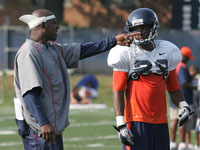 |
|
Coach Dex, back home coaching Virginia’s safeties |
 Mike: In addition to the scheme change from 3-4 to 4-3, you had to move some players around; safeties playing linebacker and linebackers playing on the line. Would that account for some of the growing pains and missed assignments?
Mike: In addition to the scheme change from 3-4 to 4-3, you had to move some players around; safeties playing linebacker and linebackers playing on the line. Would that account for some of the growing pains and missed assignments?
DEX: When you look at it, it’s a play here or a play there – a guy being here, a guy being there. It’s just that goes into it. The only way most people can judge is off stats. But if you look deeper, we had a good defensive unit last year. A lot of times we didn’t play up to the standards we should’ve played up to. This year we’re trying to fix that. Now I think our kids understand that it’s not acceptable. We’ve got to be better on defense in order for this team to move in the direction we want it to move.
 Mike: Are there any changes in the defense during the offseason that can help to improve the level of performance in 2011?
Mike: Are there any changes in the defense during the offseason that can help to improve the level of performance in 2011?
DEX: You play a season, you go back to the lab and look at it – you like this, you don’t like this as well – and you tweak here or there. You know, we’ve got a system in place. It ain’t like you’re going to go scrap your whole system. We just have to do better with some of the techniques that broke down in certain games. You have spring practice and the offseason and, obviously, talent helps. If you’ve got the best Jimmy and Joe out there, they make you look like a great coach.
Guys are getting better. You know, guys who were making mistakes last spring at this time are not making them. It’s the second year through it so guys are getting into better spots.
 Mike: Are there any young players (last year’s redshirts or this year’s true freshmen) that you feel can step in for 2011 and help make an impact and help improve the defense?
Mike: Are there any young players (last year’s redshirts or this year’s true freshmen) that you feel can step in for 2011 and help make an impact and help improve the defense?
DEX: We’re going to need some of them because of depth issues. You never want to put pressure on a kid. No matter what the media says or how many stars he carries, there’s a learning curve when they get to college. The guys we recruited this year, they’re really good players. They all have the talent to be good players in college. Now, how does that translate once they get to our campus? Who knows? We feel good about the guys we’re bringing in, really good. A lot of them are going to help us next year.
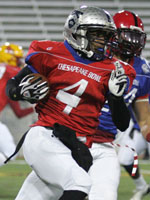 |
|
Poindexter helped bring in top Maryland athlete Darius Jennings , yet another first year who could see time in 2011 |
 Mike: Do you have any idea which players at this point might not redshirt?
Mike: Do you have any idea which players at this point might not redshirt?
DEX: The only ones you can say you’re not going to redshirt are the ones right now where you know your depth chart ain’t going to be right unless they’re in there. You wait and see when they get here – see how they pick up the playbook, you see how they pick up being in college and away from home – there’s a lot of stuff that goes into it. It ain’t just coaching them to be a good player on the field, there are off the field issues. If the kid is home sick, he’s going to have a hard time playing well. If he’s overwhelmed in the classroom, he’s going to have a hard time playing well. Some kids are more mature and some kids are less mature. We’ll see. We won’t know anything until we get them and start working them. We’ve got a pretty good idea [who might play] and we’re looking forward to those guys getting here and seeing what we really have.
 Mike: What veteran player do you feel can make the biggest impact on defense in 2011 if he puts in the work and stay healthy?
Mike: What veteran player do you feel can make the biggest impact on defense in 2011 if he puts in the work and stay healthy?
DEX: Rod McLeod will be in his third year starting. [Corey] Mosely’s third year starting. [Nick] Jenkins’ third year starting. [Matt] Conrath and Cam Johnson. We’ve got some guys who have been here a long time and have been in starting rolls. So you look for all of those guys to become the staple of your defense, to make plays, and to be the guys you can lean on when the game gets tough. I think we have quite a few guys that look like that. They’re going to have to be the leaders and show the young guys how to come in and practice, how to play and how to perform on Saturday.
 Mike: What coachable skill set do you find most freshmen lack the most?
Mike: What coachable skill set do you find most freshmen lack the most?
DEX: With freshmen you have to erase a lot of what they did in high school. They have a lot of techniques, which are probably really good for what they’re doing in high school. But when you change to college, alright we do it this way – we play man coverage this way, we play cover two this way, we play quarters coverage this way. You have to re-train their mind, re-train their feet, everything about them to do it the way you want to see it. That’s one of the toughest things to do – and the terminology part. Most of the time it’s totally different terminology and a lot more of it. That’s a process to get them to learn that.
 Mike: What’s the greatest challenge for incoming freshmen and how does the staff go about making the transition easier for them?
Mike: What’s the greatest challenge for incoming freshmen and how does the staff go about making the transition easier for them?
DEX: The greatest challenge when they first get here is being in a new environment, being away from home, and having a little bit more freedom. I’m not in the house with them and Mom doesn’t get them up in the morning. We don’t live with them, we don’t go over there and stir their eggs up, we don’t put the Pop Tarts in toaster – they have to learn to be a little more independent here. We expect them to be at the meeting on time. And how you get to the meeting, well – we expect you to be at the meeting on time. The yellow bus doesn’t go around to everybody’s dorm and pick you up and bring you over here. Certain things like that they’ve got to get used to. The demands they get in the weight room and how we lift and the intensity in which we lift with. How we keep our locker room. How we wear our uniform. And all that’s even before you get them out to the classroom to teach them anything.
 Mike: Looking toward the future, what are your aspirations as a coach? College defensive coordinator, college head coach, or do you have your sights set on coaching in the NFL one day?
Mike: Looking toward the future, what are your aspirations as a coach? College defensive coordinator, college head coach, or do you have your sights set on coaching in the NFL one day?
DEX: People ask me that all the time. And I’m telling everybody the honest truth. I live in the moment here, because I enjoy being here. I enjoy being part of this program, part of this place. I enjoy Coach London, I enjoy being with this staff. I just enjoy it here. You know, I guess I’ll take those opportunities as they come or whatever. Right now I’m happy with what I’m doing here. I want to see this place get back on top and become the place I know it can be. I just don’t walk around thinking about being a head coach. Maybe I’m screwed up that way.
 Mike: So just do your job and do it well and the rest takes care of itself?
Mike: So just do your job and do it well and the rest takes care of itself?
DEX: That’s been my motto, man. Whatever comes down the road, you just assess it when it comes up. I’m not making any calls to try to move here or move there. That just ain’t me. I try to be loyal to who I coach for. If I’m here I’m all here for him. I’m not looking at the next spot or what could happen if I did ‘this.’ Like I said, I want to win here. This is my home. This is my school. I’ve got a vested interest in this place doing well. You know, I don’t need a flip card to do a tour here.
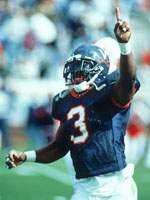 |
|
Poindexter and staff are working to bring Virginia back to its glory days |
 Mike: Talk about the future of Virginia football. How good can this program be, what’s the process to make it happen, and how long before this team can be a solid Top 25 team as it was when you were here?
Mike: Talk about the future of Virginia football. How good can this program be, what’s the process to make it happen, and how long before this team can be a solid Top 25 team as it was when you were here?
DEX: I see us going this way. We’ve always been able to win games here. If you track it back, once George [Welsh] won seven games, he won [at least] seven all the way until he retired [Editor’s note: Welsh finished 6-6 his final year]. After his first year, Coach Groh won seven or more [5 out of 6] years. I just look at the program like it’s always going to be there. Obviously, recruiting helps. That’s the lifeline of your program. So you get good players, you get guys that can really play and want to go to school, that’s what’s going to take our program to the next step. I look forward to it. People think you’re going to have to wait a long time. But if you look at college football nowadays, you get a few breaks here or a few breaks there … it ain’t always the best team skill-wise that wins. It’s the team that’s the most disciplined and doing the right things. Obviously, some talent has got to go along with it.
We’re looking to have a good season this year. It ain’t like we want to struggle another year. We want to win. Coach London came here to win, he didn’t come here to fiddle around – oh we need four years to turn this thing around – we came here to win and have a plan in place. You see how hard we went out recruiting and we’re going to continue to recruit that way – go after the top guys and try to bring them in and put solid classes together. Once we do that we’ll take back off and we’ll be in the hunt – we’ll be in the hunt every year. To say we’re going to be up for the National Championship every year, I don’t know, but we’re going to have really good teams here.
Mike Ingalls founded TheSabre.com as a hobby in 1996 under the name VirginiaFootball.com. The site changed its name, became a business, and earned fully credentialed media status in 1998. “The Sabre Interview” appears periodically on the TheSabre.com as Mike sits down for in-depth interviews with your favorite Hoos.



